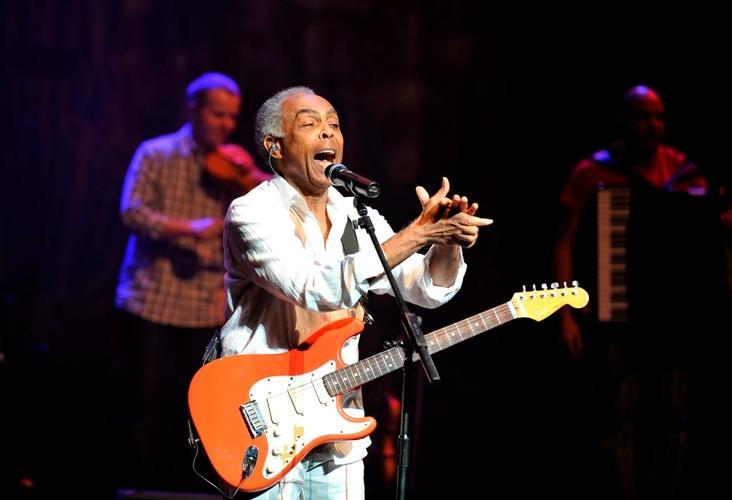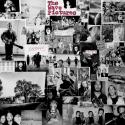The dreadlocks are gone, the dark suit is gone, the acoustic guitar which was his faithful travelling companion during the four years as Brazilian Minister of Culture, is also gone. Instead, Gilberto Gil skipped on stage with a cool, short, grey haircut framing his beautifully sculpted features, wearing a white shirt and check trousers, and strapped on a Fender Stratocaster. As his first notes chimed in the air, his six musicians stood poised in front of a magnificent, graffiti-collaged banner stretching across the back stage, then entered the jaunty, two-step rhythm which launched an evening of musical surprises
It was not what the mostly Brazilian audience anticipated; for them, a Gil concert means hearing, from the first bars, his hits of five decades and his most recent album, and singing and dancing along to almost every one. But, the singer explained, “This is a show of forró, the kind of music I was born into.”
The evening was a total contrast, musically and culturally, with the cool of Rio’s bossas and the rhythmic African complexities of samba which have always inspired Gil’s eclectic repertoire, but forró (and other North-Eastern styles) always crept in somewhere. Forró is President Lula’s music too, songs from the sertao, that vast red-earthed cowboy territory which features in films like Central Station. Traditionally played on accordion, triangle and zabumba drum (a large snare beaten on both sides with a thin stick and one covered in a muffling furry tip), it’s danced to in fast twirls and fast, sexy, shuffled steps.
Nowadays, it is associated with the economic migrants (including Lula) who fled in search of work and still occupy the lower classes but, in spite of their hard-life reality, it’s irresistibly joyous. That was obvious as his band swayed and danced all through the two-hour performance and radiated smiles, and Gil danced like never before, a kind of funky chicken forró which delighted him and everyone in the room.
Modern urban forró has expanded from trios into electric, more eclectic funky ranges whilst still possessing a rural,down-homey quality shared with country music all over the Americas. Its core of accordion, triangle and zabumba now mingles with electric guitars and bass and Gil has added a virtuoso violinist, a French forró-phile who lends a strange but irresistible Celtic dimension.
On stage, the singer operates typically democratically, playing dizzying duets with the guitarist, Sergio Chiavazzoli, o changes tones and textures, using plectrum or bottle-neck on his electric guitars, and switching to plinky cavaquinho (Portguese mandolin) and banjo for frenzied dialogues with the singer, the violinist (their fabulously intense, rousing conversation sounded like a lock-in at a Brazilian shebeen. The programme moved through classics by Gil’s heroes, including Luis Gonzaga, his friend and mentor, pioneer of the modern, urban and more African sound, and Dominguinhos, whose gorgeous, soulful ballad, "Lamento sertanejo" emerged as a duet between Gil and the violin which offered a chance to hear his unmistakeable, and softly smooth, expressive voice rising and falling like his Bahian speech.
His guitar playing, chords and melodies are as mesmeric, off-beat and tropically colourful as when Caetano Veloso used to sit, as a twenty-something, watching in awe. Gil has left behind the restraints of being a Minister but was always a politician in the mildest sense. And even when in office, he closed his speeches – and often Lula’s too - with Bob Marley’s or his own songs. He told me after the show that the pause for politics was “a good thing; it helped me focus, and learn". Choosing this startlingly different repertoire offered a challenge to London’s largely well-heeled audience who’ve grown up away from home or moved out for a while and came to hear hits which link them to home.
After a couple of calls for a classic, he asked them: “Allow me to play forró just for a change.” And they did; they danced. Maybe a whole show was a bit excessive, I suggested to him afterwards. “No, Sue!” he said, laughing. “They just like the hits. But as I told them, sometimes you need refreshing.” He did offer one concession, the 1972 "Expresso 2222", which he told the crowd, he wrote in London, while he was ‘on holiday’ here. He then added the truth: “They were hard times in Brazil then, they kicked me out.” That song welcomed him back from exile (with Caetano Veloso) and carries echoes of that ‘hard’ ie dictatorship era - and helped bring him everlasting popularity.
Ending the encores, Gil thanked the audience with another interesting statement: “It’s not usual to come and hear a sound like this, with French, Spanish, Bavarian and Scottish music in it. But we are a melting pot, as Roosevelt used to define Brazil. And we love being that way; the civilizing process was designed to be this.” And with that,he danced off-stage blowing kisses, and into his dressing room where Quincy Jones was waiting to continue their pre-show conversation.















Add comment